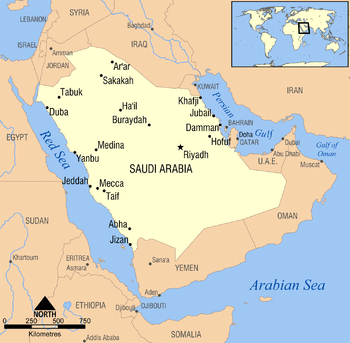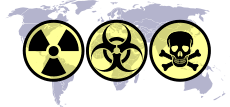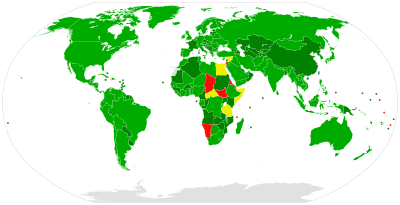Saudi Arabia and weapons of mass destruction

| Weapons of mass destruction |
|---|
 |
| By type |
| By country |
|
| Proliferation |
| Treaties |
|
Saudi Arabia has not officially maintained and possessed weapons of mass destruction (WMD). In truth, Saudi Arabia has signed and approved the convention on the prohibition of the development, production and stockpiling of biological (bacteriological) and toxin weapons in 1972.[1][2][3] Nevertheless, Saudi Arabia has planned for nuclear foundations[4][5] and according to some observations, its plans can be led in nuclear weapons.[6][7] According to some reports, Riyadh has an alleged deal with Pakistan regarding nuclear weapons projects.[8][9][10] Moreover, there are claims that Saudi Arabia has used chemical and biological weapons in Yemen.[11][12]
Background
Saudi Arabia, officially is a non-nuclear-weapon state party to the Treaty on the Non-Proliferation of Nuclear Weapons,[8] and it has also an agreement with International Atomic Energy Agency.[13] Riyadh has been accused of following nuclear[6][7] and chemical weapons, despite being a follower of IAEA,[14] NPT[15] and OPCW.[16]
On the other hand, Riyadh is planning a vast project by the value of $80 billion to build 16 large reactors and several small reactors. The first nuclear reactor is expected to be launched in 2022.[17] Saudi Arabia has invited American companies to have partnership with it in its nuclear program. Besides, it is remarked that Washington commonly asks countries to sign "123 agreement" in order not to product nuclear bombs, but so far, Riyadh has refused to sign it or any other agreement which can prevent it from enriching uranium in the future.[18] Meanwhile, Institute for Science and International Security announced that Saudi Arabia will follow atomic weapons due to fear of JCPOA (and Iran),[19][20][21] whereas IAEA confirmed that Iran’s nuclear program is peaceful, and it not regarded as a dangerous program.[22][23][24]
Nuclear foundations
Riyadh officials had travels to France and Russia and signed several transactions, among establishment of atomic foundations in Saudi Arabia. Riyadh is pursuing its open negotiations about establishment of atomic foundations in front of media.[25] Despite that, it has been secretly looking for the establishment of a scientific atomic center by the co-operation of Pakistan,[7][25] which can be associated with purchasing nuclear weapons from Pakistan.[26][27]
Riyadh declared that it was following a nuclear power program without co-operation of other countries, and according to a royal command in April 2010: "The development of atomic energy is essential to meet the Kingdom's growing requirements for energy to generate electricity, produce desalinated water and reduce reliance on depleting hydrocarbon resources." KA-CARE has been set up in the capital of Saudi Arabia in order to progress this agenda which is considered as an alternative to oil, and also to be the proper agency for the purpose of treaties on nuclear energy signed by Saudi kingdom. Besides, it appointed the Finland- and Swiss-based Poyry consultancy company in order to assist define "high-level strategy in the area of nuclear and renewable energy applications" with desalination.[28]
As well as this, the (South) Korea Atomic Energy Research Institute has signed an agreement with KA-CARE in March 2015 which is led to evaluate its potential to build two or more than two South Korean SMART reactors. Furthermore, in March/August 2017, the Saudi Arabia Geological Survey signed an agreement to a Chinese nuclear company (CNNC), and it was associated with co-operation on uranium exploration. CNNC mentioned that this will explore 9 potential areas for the resources of uranium in Saudi Arabia.[28]
Nuclear weapons
 | |
Pakistan |
Saudi Arabia |
|---|---|
The BBC reported using multiple sources that Saudi Arabia has funded nuclear weapons development in Pakistan,[8][29] and the Saudi government believes that it is able to gain nuclear weapons at will.[26] A senior NATO decision maker did mention that he personally viewed intelligence reports indicating that nuclear weapons which have been manufactured in Pakistan by the request of Riyadh, are ready for delivery.[8] Saudi Arabia's foreign minister neither rejected nor confirmed the possibility of purchasing nuclear weapons.[27] Furthermore, Saudi royalty and other high-ranking officials have explicitly mentioned warnings in regards to their intention to obtain nuclear weapons if Iran were to come in possession of such weaponry.[8][30][31][22] On 15 March 2018 Saudi defence minister and heir to the throne Prince Mohammad bin Salman made such a statement on the CBS 60 Minutes programme.[32]
Nuclear weapons delivery
According to the BBC, Saudi Arabian attempts to acquire ballistic missiles capable of fielding a nuclear warhead go back several decades.[33] Riyadh possesses DF-3A (NATO: CSS-2) as a Chinese missile which is used in nuclear weapons delivery.[34] In fact, it is regarded as a Chinese liquid-fueled, single-stage, nuclear medium-range ballistic missile. Saudi Arabia bought several dozen (between 36 and 60) of this kind of missile from China in 1987.[35] Riyadh displayed them in a parade 2014, the first public viewing of the weapons.[36]
 Participation in the Biological Weapons Convention
| |||
| Signed | 10 April 1972 | ||
|---|---|---|---|
| Location | London, Moscow, and Washington, D.C. | ||
| Effective | 26 March 1975 | ||
| Condition | Ratification by 22 states | ||
| Signatories | 109 | ||
| Parties |
180 as of January 2018 (complete list) | ||
Chemical and biological weapons
Officially, Saudi Arabia is regarded as a party to both the Biological and Toxin Weapons Convention (BTWC), and also the Chemical Weapons Convention (CWC).[13] Of course, it has been mentioned by some reports that Saudi Arabia directly/indirectly has been used chemical and biological weapons in the wars[11][12] and also Saudi Arabian chemical materials has been discovered in the city of Aleppo, an official news agency of Syria said.[11] Additionally, Yemeni Major General Khalid al-Barayemi pointed out that there have been found chemical weapons in several trucks bounds of Saudi Arabia for the areas that are under the control of ISIS and likewise Al-Qaeda.[12] As well as charging of using chemical and biological weapons, there are other charges for Riyadh, too.
While it has taken four years to campaign Saudi Arabia in Yemen, groups of human rights have repeatedly accused it of civilian casualties during the bombardment in Yemen. According to reports of the UN Office of the High Commissioner for Human Rights, almost 6,000 civilians were killed and 9,500 wounded from March 2015 and February 2018. [37]
According to the investigation of 10 Saudi-led airstrikes on March 2018, 157 deaths and 135 injuries were reported and it showed that Riyadh’s attempt to control harm to children "remain largely ineffective."[38]
| Toxicity | |
|---|---|
 | |
| The skull and crossbones is a common symbol for toxicity. | |
| Classification and external resources | |
| ICD-10 | T65.9 |
Toxic and pathogenic weapons
Saudi Arabia is officially considered as a state party to (biological and) toxin weapons[13][39]. And according to this agreement(s), the States Parties have undertaken to prepared annual reports upon particular activities relevant to the Biological Weapons Convention which is consisted of information on prevalence of infectious diseases, and also similar events which are caused by toxins; etc.[40]
"The Saudi government's use of weapons which contain toxic and pathogenic gases in air and missile strikes against residential areas is aimed at genocide and breaking the legitimate resistance of the brave Yemeni people," Shamkhani as the Secretary of Iran's Supreme National Security Council (SNSC) did remark in a meeting which was held with an agent of Yemen's high council of revolution in Iran. Meanwhile, according to a report by the human rights watch, Saudi Arabia has used a kind of poisonous gas in four airstrikes on diverse parts of the province of Sa'ada in Yemen.[41]
Sunjeev Bery, Amnesty International’s advocacy director for the Middle East and North Africa stated that “The United States must not provide or sell white phosphorus munitions to Saudi Arabia or any other military that would use them in the Yemen conflict,” On other hands some images and videos posted to social media shows that Saudi Arabia appears to be using U.S.-supplied white phosphorus munitions in its war in Yemen. It made concern human rights groups.[42]
Saudi Arabia’s biological warfare
Since March 2015, Saudi Arabia and its allies used biological warfare in Yemen.Yemenis were suffering from cholera outbreak. Cholera is caused by the bacteria Vibrio cholera.[43]
See also
References
- ↑ Convention on the Prohibition of the Development, Production and Stockpiling of Bacteriological (Biological) and Toxin Weapons and on their Destruction state.gov Retrieved 22 January 2018
- ↑ Disease as a Weapon: Assessing the international methods of ensuring biological weapons nonproliferation portfolio.du.edu Retrieved 13 January 2018
- ↑ Status of the Convention www.opbw.org Retrieved 13 January 2018
- ↑ KSA takes first step towards nuclear plant tender: sources reuters.com Retrieved 16 January 2018
- ↑ Nuclear Power in Saudi Arabia world-nuclear.org Retrieved 16 January 2018
- 1 2 "Saudi Arabia is looking for nuclear weapons". fars.iribnews.ir. 16 January 2018.
- 1 2 3 "Pakistan, Saudi Arabia in secret nuke pact Islamabad trades weapons technology for oil". globalsecurity.org. 24 January 2018.
- 1 2 3 4 5 "Saudi nuclear weapons 'on order' from Pakistan". bbc.com. 17 January 2018.
- ↑ Has KSA provided nuclear arsenal? fa.alalam.ir Retrieved 16 January 2018
- ↑ Russell, op. cit, p.72.
- 1 2 3 "Syrian forces uncover Saudi chemical weapons agents in Aleppo". presstv.com. 22 January 2018.
- 1 2 3 "Army Spokesman: Saudi Forces Use Chemical, Biological Weapons in Yemen's Ma'rib". en.farsnews.com. 22 January 2018.
- 1 2 3 "SAUDI ARABIA". nti.org. 17 January 2018.
- ↑ List of Member States News iaea.org Retrieved 27 January 2018
- ↑ Treaty on the Non-Proliferation of Nuclear Weapons disarmament.un.org Retrieved 27 January 2018
- ↑ 3. Convention on the Prohibition of the Development, Production, Stockpiling and Use of Chemical Weapons and on their Destruction treaties.un.org Retrieved 27 January 2018
- ↑ Atomic Saudi Arabia, perspective 2040 tasnimnews.com Retrieved 16 January 2018
- ↑ Co-operation of USA and KSA in order to built 2 atomic reactor euronews.com Retrieved 16 January 2018
- ↑ Saudi Arabia is turning to nuclear weapons for fear of JCPOA alalam.ir Retrieved 16 January 2018
- ↑ KSA is turning to atomic weapons for fear of JCPOA farsnews.com Retrieved 16 January 2018
- ↑ Will the U.S. Help the Saudis Get a Nuclear Weapon? nytimes.com Retrieved 7 March 2018
- 1 2 "Saudi Arabia orders nuclear weapons to Pakistan". irna.ir. 18 January 2018.
- ↑ The agency confirmed that Iran's nuclear program is peaceful iribnews.ir 16 January 2018
- ↑ IAEA: Iran Honoring Nuclear Deal manartv.com.lb Retrieved 16 January 2018
- 1 2 "Disclosure of Saudi's secret nuclear program with Pakistan". tasnimnews.com. 17 January 2018.
- 1 2 "Saudi Arabia orders nuclear weapons to Pakistan". bbc.com. 17 January 2018.
- 1 2 "The Mystery of Buying Nuclear Weapons from Pakistan by KSA". yjc.ir. 18 January 2018.
- 1 2 "Nuclear Power in Saudi Arabia". world-nuclear.org. 7 February 2018.
- ↑ Saudi Arabia banks on Pakistan for nukes: BBC report livemint.com 17 January 2018
- ↑ Pakistan rejects report about Saudi support for N-plan dawn.com Retrieved 18 January 2018
- ↑ Iran’s Next President and the Third Nuclear Strategy al-monitor.com Retrieved 18 January 2018
- ↑ "Saudi Arabia pledges to create a nuclear bomb if Iran does". BBC News. 15 March 2018. Retrieved 15 March 2018.
- ↑ Urban, Mark (2013-11-06). "Saudi nuclear weapons 'on order' from Pakistan". BBC News. Retrieved 2018-03-13.
- ↑ Cordesman, op. cit, p.10
- ↑ DF-3A / CSS-2 fas.org Retrieved 8 February 2018
- ↑ "Saudi Arabia unveils part of strategic missile force — a deterrent move against Iran?". Defense Update. 2 May 2014. Retrieved 9 May 2014.
- ↑ Staff, Writer. "'Double standards: US, UK, France stand by Saudis in Yemen but pose as moral crusaders in Syria'". RT. Retrieved 15 April 2018.
- ↑ Detsch, Jack. "US still pouring weapons into Yemen war". al-monitor. Retrieved 8 March 2018.
- ↑ SAUDI ARABIA / Acronym institute for disarmament diplomacy Retrieved 7 February 2018
- ↑ Biological Weapons un.org 7 February 2018
- ↑ Shamkhani: Saudi Arabia Uses Biological Weapons against Yemeni People en.alalam.ir Retrieved 22 January 2018
- ↑ Gibbons-Neff, Thomas. "Saudi Arabia appears to be using U.S.-supplied white phosphorus in its war in Yemen". washingtonpost. Retrieved 19 September 2016.
- ↑ "US and Saudi Arabia's biological warfare in Yemen - IUVMPRESS". iuvmpress.com. Retrieved 2018-07-20.
External links
- Nuclear Power in Saudi Arabia, World Nuclear Association
- DF-3A / CSS-2, China sold several dozen outmoded DF-3 missiles to Saudi Arabia
- Campaigners warns of “toxic” UK arms deals with Saudi Arabia
- Saada's Governor: Saudi Arabia is Experimenting Toxic Weapons in Yemen's Saada